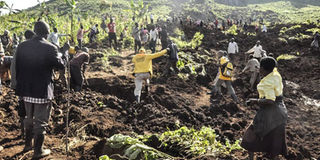Landslides: Leaders call for faster approach to resettle residents

Trapped. Residents of Nasubu Village in Bulaago Sub-county, Bulambuli District, search for missing persons following landslides last week. PHOTO BY FRED WAMBEDE
What you need to know:
Warning. Environment experts and local leaders warn of more catastrophes as rain continues to pound Mt Elgon region.
Leaders in Bulambuli District have asked government to find a holistic plan to resettle residents in landslide-prone areas.
Landslides have continued to claim lives in Bugisu Sub-region, which comprises Mbale, Bududa, Sironko, Bulambuli, Manafwa, and Namisindwa districts.
Less than a week ago, multiple landslides, triggered by a downpour, hit Bulaago, Nabiwutulu and Simu sub-counties in Bulambuli, leaving five people missing and 100 families displaced.
One body has so far been retrieved in Nasubu Village, Bulaago Sub-county.
Residents and leaders accuse government of delaying to act whenever the disasters strike.
“We are citizens of this country but government treats us like how the Rohingya Muslims are being treated in Myanmar. They respond at their own pace,” Mr Paul Gidoi, a resident of Nasubu Village, said.
The Rohingya are a stateless Indo-Aryan ethnic group who reside in Rakhine State, Myanmar and the United Nations in 2013 described them as one of the most persecuted minorities in the world.
“Landslides have been here for long but our people continue to die,” Mr Denis Wanyero, a youth councillor in Bulambuli, said.
According to environmental experts, more than 100,000 people in Bugisu are at risk since heavy rain is predicted to continue until October.
Mr Francis Alinyo, the project coordinator of Mt Elgon Tree Growing Enterprise, an NGO, said landslides will continue to occur, especially in areas where vegetation cover is too low.
“We need to restore the ecosystem by planting trees because they prevent the speed of landslides and as a result, mitigate the likely damage,” he said.
Mr Alinyo said human activities such as deforestation, degradation of wetlands, and poor farming methods, among others, cause landslides.
The organisation started operating in the region in 2010 and it distributes two million seedlings freely to farmers each year.
“We have tried to restore the hills that had been left bare due to cultivation but more needs to be done,” Mr Alinyo said, calling for massive reforestation.
In Nakizubo Village, Nabiwutulu Sub-county, one of the areas which was hit by a landslide, faces increased soil erosion.
“The trees have been massively cut down and the hill has been left bare that is why there is a lot of soil being washed away whenever it rains,” Mr Christopher Kolo, resident, said.
Mr Kolo said torrential rains always force River Kajera to burst its banks causing flooding in Bulaago Trading Centre and neighbouring sub-counties.
Mr Fred Namugona, the speaker of Bulaago Sub-county, said the recent landslides and floods also swept away several bridges.
“Accessibility has become a challenge now,” he said, adding that several residents have been displaced.
Mr Siraje Wamai, the vice chairperson of Bulambuli, urged government to speed up the relocation of residents at risk to Bunambutye resettlement site.
“The affected people need to be relocated and resettled in safe places. They should not be allowed to return to their homes because they will get trapped there,” Mr Wamai said.
In May, government kicked off the resettlement exercise under the first phase after completing the construction of 101 houses in Bunambutye Sub-county. More than 700 people have been resettled.
The construction of houses in the second phase kicked off and more 350 houses are set to be built. By last month, most of the houses were at the window level.
The houses are being constructed by UPDF engineering brigade, prisons and police construction unit.
However, a section of MPs castigated government for slow response.
“The OPM (Office of the Prime Minister) officials don’t want to listen to other quicker alternatives yet the people at risk are many and need urgent relocation and resettlement,” Mr John Baptist Nambeshe, the Manjiya County MP, said.
Mr Nambeshe said government should relocate survivors to various safe centres or sub-counties within the districts or pay them to resettle themselves. However, Mr Julius Mucunguzi, the senior communications officer in OPM, said government was committed to ensuring that people living in landslide-prone areas are relocated.
“The pace of the construction in the second phase is impressive and most of the houses are nearing completion so that the second batch of victims is moved,” Mr Mucunguzi said.
He said government will also provide information regarding weather changes so that residents relocate to safer places.
“The communities should heed to information alerting them of possible damages, especially in times of heavy rains,” Mr Mucunguzi said.
Mr James Ingoi, the deputy chief administrative officer of Bulambuli, said they have been encouraging residents to embrace good farming practices and afforestation to avert landslides.
“We want people to engage in conservation activities to restore the degraded ecosystem to prevent disasters,” he said.
Mr Martin Owori, the commissioner for Disaster Preparedness and Management, last year asked residents in high risk areas to relocate until the rains reduce.
“People living in risky steep slopes and close to river banks are strongly urged to relocate and stay in homes of friends and relatives in safer locations,” he said.
Mr Owori attributed the catastrophes to environmental mismanagement.
“We have cut down trees, encroached on forests and wetlands. We no longer have windbreakers because all trees have been cut down,” he said.



